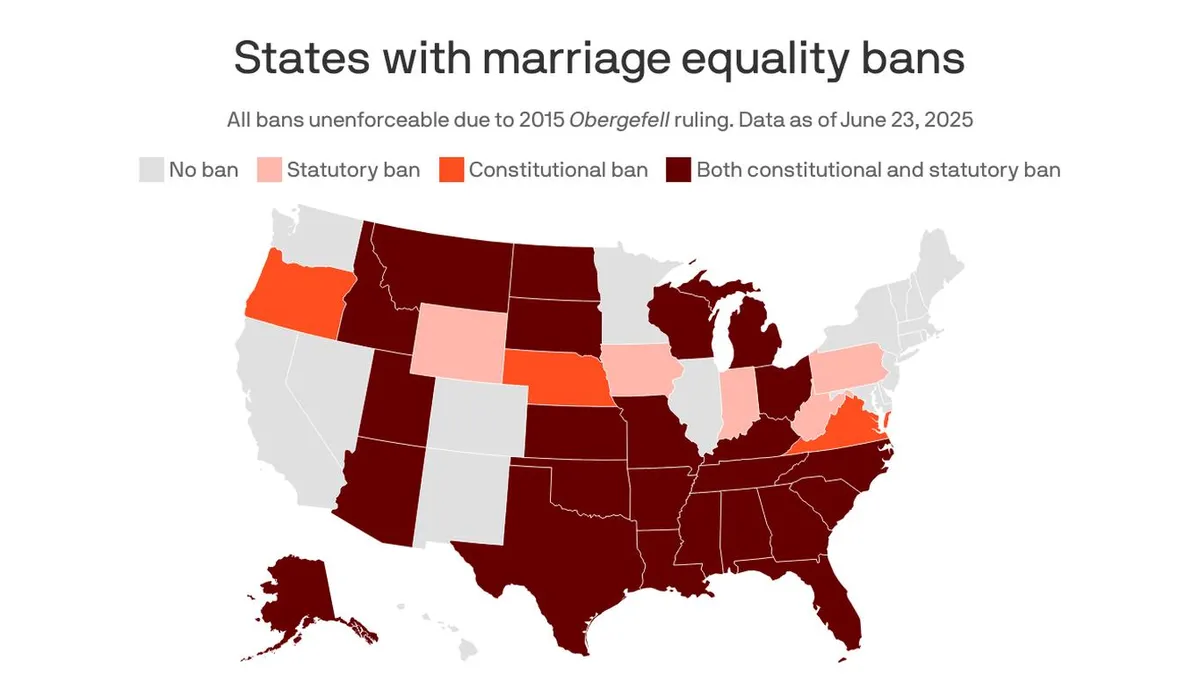
As the 10-year anniversary of Obergefell v. Hodges approaches, the landscape of marriage equality in the United States is increasingly precarious. More than two dozen states have enacted trigger laws that would significantly restrict or eliminate marriage rights for same-sex couples if the Supreme Court were to overturn this landmark decision. Understanding the implications of these laws is crucial as they pose a serious threat to the rights of LGBTQ+ individuals nationwide.
According to recent data from the Movement Advancement Project, 32 U.S. states currently have constitutional or legislative bans on marriage equality. While these bans are unenforceable due to the 2015 Supreme Court ruling in Obergefell v. Hodges, the potential for their revival looms large. This alarming statistic indicates that approximately 60% of LGBTQ+ adults reside in states where their access to marriage equality could be drastically altered should the Obergefell decision be overturned.
In a clear indication of shifting political tides, Republican lawmakers have introduced several ballot measures aimed at undermining the rights of same-sex couples to marry. Notable states such as Idaho, Michigan, Montana, North Dakota, and South Dakota are seeing efforts to reverse the Obergefell decision, as reported by NBC News in February. Moreover, in states like Missouri, Oklahoma, Tennessee, and Texas, lawmakers are proposing legislation that, while not directly referencing the Supreme Court ruling, seeks to establish a new category known as covenant marriage, effectively limiting marriage to one man and one woman.
In response to these anti-same-sex marriage efforts, ballot initiatives have emerged in states such as Idaho, Nebraska, Virginia, and Arizona. These initiatives aim to empower voters to decide on the future of marriage equality in the 2026 elections. This grassroots movement illustrates a robust counter-effort to the ongoing legislative challenges faced by same-sex couples.
The judicial landscape surrounding marriage equality has also seen significant commentary from the Supreme Court. In 2022, Justice Clarence Thomas suggested that the Court should reconsider its stance on same-sex relationships and marriage while delivering a concurring opinion in the case that overturned Roe v. Wade. This statement raised alarm bells among LGBTQ+ advocates, as it hinted at a potential reevaluation of other precedents established under substantive due process.
In a bid to safeguard marriage rights, Congress passed the Respect for Marriage Act later in 2022, which codified the right to same-sex and interracial marriages. However, it is important to note that this legislation does not prevent states from enacting measures that could ban or restrict same-sex marriage should Obergefell be overturned.
The fight for marriage equality remains at a critical juncture. As anti-LGBTQ+ legislation gains momentum in various states, the need for vigilance and advocacy becomes increasingly important. The ongoing developments highlight the necessity for continued activism and legislative protection to ensure that the rights won a decade ago are not lost.
For those interested in the intersection of corporate responsibility and societal issues, it is worth noting that U.S. companies have begun to reconsider their Pride sponsorships in light of mounting pressure against diversity, equity, and inclusion (DEI) initiatives.